On Delhi’s Borders, Trenches, Barricades and Spikes – But Morale High as Thousands Stream In
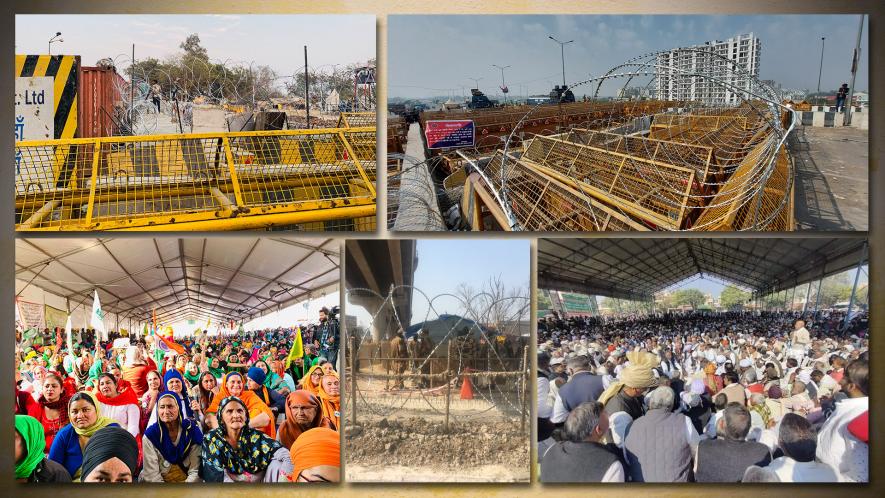
Farmers’ protest sites at the borders of the national capital present a shocking picture of the government’s hostility towards farmers. Police have put up multiple layers of barricades of reinforced concrete, topped by razor wire, roads are festooned with iron rods and spikes, empty containers block main carriageways while concrete blocks cap small lanes that open on the roads. Movement is tightly restricted, traffic diverted and farmers are deprived of sanitation, toilets, even net connectivity. Farmers have been camping in protest against the three farm laws and other anti-farmer policies of the Modi government since November last year.
But behind the ominous barricades, thousands of farmers and their families continue to stay put, exuberant in their determination to get the three black laws withdrawn. If anything, the government’s open hostility has injected more energy. Fresh support is pouring in from across villages of Haryana, Punjab and Western Uttar Pradesh. Seeing the government’s obstructions, local residents have started helping farmers – by giving them water and provisions, allowing use of toilets and even joining their dharna.
Here is what NewsClick reporters saw at Tikri, Ghazipur, Singhu borders and the Palwal and Shahjahanpur protest sites located kilometers inside Haryana.
Residents of Tikri Come Forward in Support
Ronak Chhabra/ Bahadurgarh: “The more the government will intimidate us, the stronger our movement will become,” these words rang the air at Tikri border in the outskirts of Delhi, where thousands of farmers have been camping since November last year.
This has only become more palpable than anything on the ground, days after Delhi police beefed up the security and turned the protest site into nothing short of a fortress.
Yellow barricades are now accompanied by kerb stones, boulders, concertina wires (razor wires), spikes, cranes, and shipping containers, among others, across the approach roads to the protest site here – which according to the police are necessary steps to be taken post the Republic Day controversy.
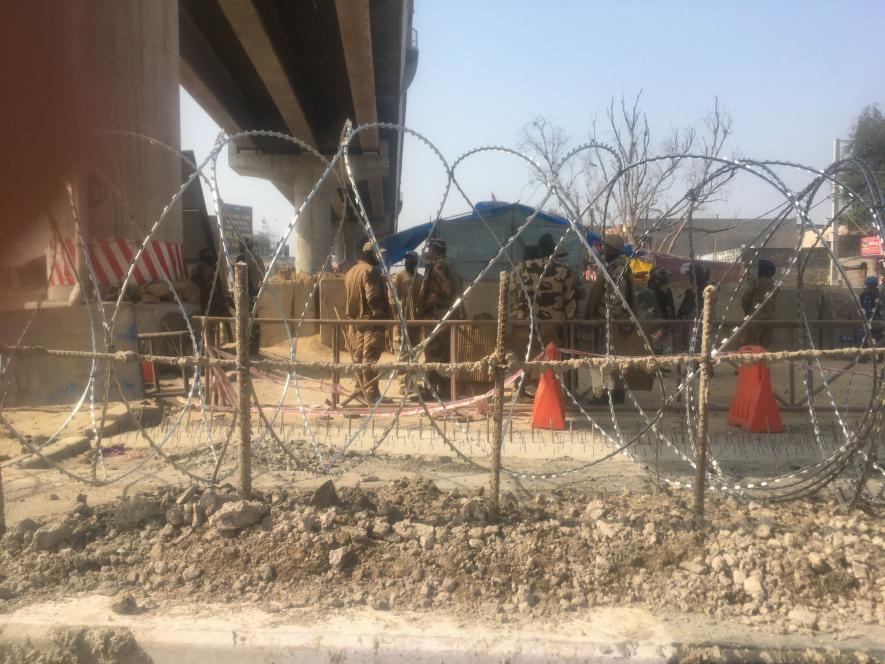
Police barricades at Tikri border.
“The internet is down here, the makeshift toilets were removed, while the garbage is piling up since the municipality workers haven’t come after January 26. The police is also not allowing ration and water tankers to reach us,” said Gurpreet Singh, 45, from Punjab’s Mukhtar Sahib.
Having said that, he, however, added that the people from Haryana and local residents have come forward in supporting the protest – which has come as an unintended effect of the heightening of the police security.
A closer look into the arrangements also reveals that the spirit of the protesting farmers remain high enough, and that they are in no mood to budge now, come what may.
Major Singh Randhawa, vice president of the Bharatiya Kisan Union (Mansa), said, “Ever since they started intimidating us, we have found support from the local people here. The factory owners here are providing us their private electricity connections to use; the residents are allowing farmers to use their washrooms.”
Echoing the same, Sudesh Goyat, a social activist from Haryana’s Hisar district said that the recent measures taken by the police are in particular causing trouble for the women and elderly protesters here.
“But we are finding help from the local people who have allowed us to use their washrooms,” she said, adding, “They are also providing us with hot water to bathe in the morning.”
Ashok Kumar, 45, who hails from a farming family and is currently owns a shop at the road where farmers are camping, said that almost everyone here has been affected by Prime Minister Narendra Modi’s policies in the past and as such they understand the fears of farmers. “Earlier, the farmers used to get whatever they needed on their own but now that is not possible as their free movement is impossible. In such times, we, the local people, often fetch items of daily use for them,” he added.
“We do this because we feel it is our responsibility to stand with the protesting farmers and their cause,” he added.
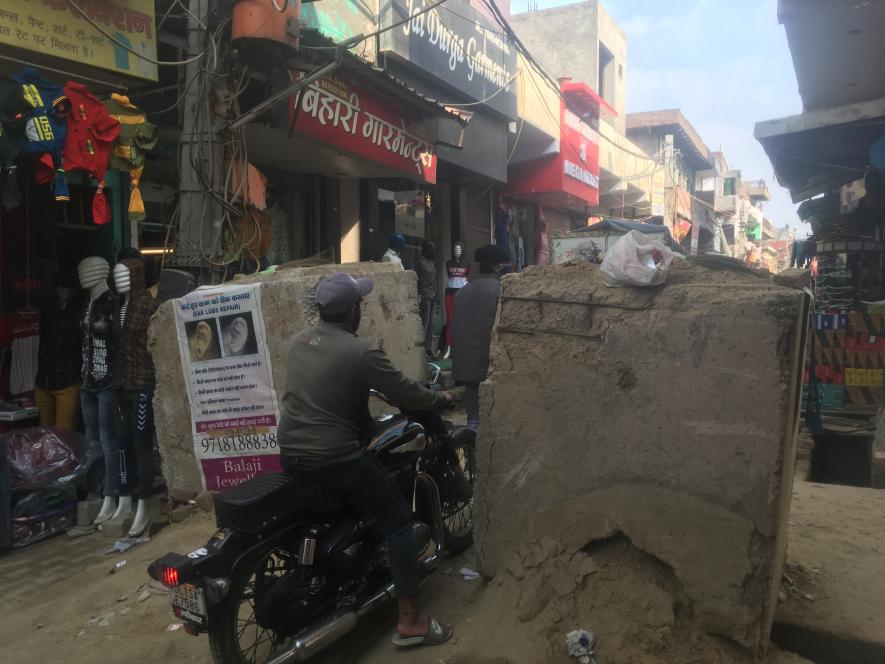
Cement blocks obstructing the inner lane near farmers' protest at Tikri border.
On Wednesday, February 3, the rolling in of tractors from the nearby villages of Haryana continued unabated. Among them was Sheela Devi, 60, of Satrol Khap, who had arrived with a group of total 150 men and women from Hisar’s Narnaud tehsil. “Every week we visit Tikri border and bring daily essentials for the farmers with us. We knew that police has stopped ration hence this time we have got over 100 litres of milk, lassi, a water tanker, and some 100 or so mattresses with us.”
Rajbir Sharma, 35, of the same group explained how the funds were arranged for the same. “A rate for donation has been fixed by our panchayat - those who have land are being asked to donate Rs. 200 per acre; while, Rs. 200 are being collected from a family who doesn’t own any land; a family with salaried income is being asked to donate Rs. 5,100,” he told NewsClick.
“As such, nearly Rs 10-20 lakh have been arranged from our one village only,” Sharma of Petwar village in Narnaud tehsil added.
Additionally, the protesting farmers have also managed to keep the flow of information running, even though the blockade of internet has hampered the individual protester to connect over a video call with his/her family back in their villages.
Anoop Singh, coordinator in one media group namely “Kisan Social Army” that is active at Tikri Border, rued that the internet blockade initially posed major challenges in maintaining communication.
But that has been dealt with now, according to him. “Some of us walk about 1 km or so towards Delhi and then use internet,” he said. Around 90 people, who are managed by Singh, maintain WhatsApp groups in Punjab and Haryana, forming a vast network for information dissemination.
On being asked what is being shared in those groups these days, Singh informed that currently information relating to the chakka jam, called on January 6, is the discussing point. “We are ensuring that no fake news is circulated regarding the same. We want the programme to be held in a peaceful manner,” he said.
No Dialogue till Our Youth Released, Ghazipur Farmers Say
Tarique Anwar/ Ghazipur: Muti-layered barricading is in place at the Delhi-Meerut Expressway near the Ghazipur protest site. The barricades which also comprise concrete blocks, have been fenced with concertina wires. Iron barricades at different lanes have been fixed with each other through electric welding.
Narrow lanes leading to nearby Ghaziabad and colonies have also been blocked by the police. Even doctors and paramilitary staff are not allowed to travel to and fro using the elevated and the road below the flyover.
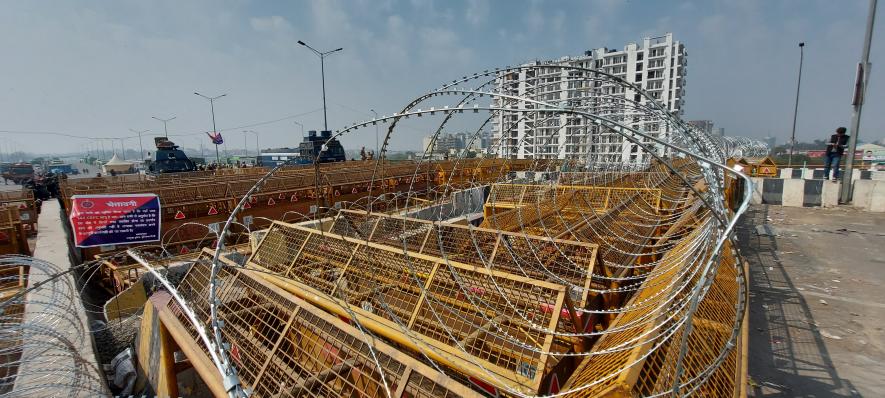
Barricades and razor wire put in place by Police at the Ghazipur border.
Earlier, farmers were occupying only one lane on the elevated road, while the rest eight lanes were free for people to travel. Now, the police have barricaded all lanes, giving a tough time to people who regularly use the road to reach their destinations.
Two doctors, one working with a nearby ESI Hospital and the other with Max Hospital, were seen arguing with officials of the Delhi Police who were not letting them to go to Ghaziabad. "I am a doctor by profession. I need to take care of patients. If you won't let us go, how will I reach my hospital. Don't you think you are putting several lives at stake?," one of the doctors questioned a policeman on duty, seeking to talk to his senior officer.
The other doctor accompanying her succeeded even to enter the other side of the barricade through a narrow gap, but he was soon pushed back. "You are denying citizens their right to free movement. Blocking the roads for no reason is a mockery of the system. Nothing can be as brutal as infringing people's right. Which laws allow you to create inconvenience for citizens?" the doctor, who had crossed the barricades, could be heard telling the cops angrily.
Even the ambulances carrying patients are not given a way to pass. The direct routes to Akshardham, Anand Vihar, etc. have been diverted, causing a massive jam on the alternate routes.
Water and electricity supply to the protest site was restored following criticism.
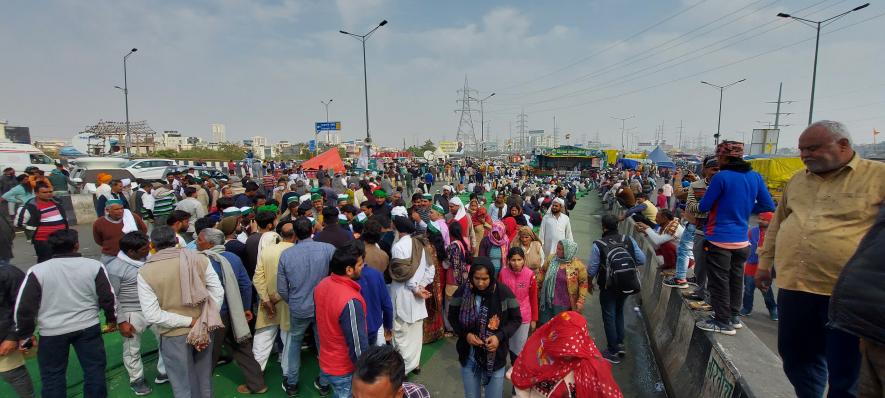
Still from farmers' protest at Ghazipur.
Thousands of farmers from across western Uttar Pradesh, Haryana and Uttarakhand are still pouring into Ghazipur. The protest site which saw thinning crowds post the incidents of January 26 are again swelling with people. The protesters seem to be more resilient and committed to fight back every alleged trick employed by the government to weaken the protest.
"We are peaceful and will continue to remain so. But we warn the government not to further try any adventurism. We are disciplined and following our leaders, who are being targeted. The government must not take our patience for granted," one of the farmers said.
The leader of the farmers camping at Ghazipur, Rakesh Tikait, national spokesperson of the Bharatiya Kisan Union (BKU) also reiterated that they are ready for a long haul. "We will keep camping here till October this year. Bill wapsi nahin to ghar wapsi nahin (we will not return home until the bills, which are now Acts, are withdrawn). Strategy to take this movement any further will be announced after October," Tikait told NewsClick.
On being asked how this deadlock will end if both farmers and government won't relent and resume talks, he said farmers’ unions never hesitated to engage in negotiations.
"But now, any dialogue will take place only when our youth are released and cases against them are repealed. Second, nothing less than the nullification of the laws and legal guarantee on the MSP (minimum support price) will be discussed if further round of talks take place. We have now added the timely payment of sugarcane to our agenda, which will keep on increasing if the government does not leave its arrogance and agree to assemble on negotiation table without any pre-condition," he asserted.
"It's a people's movement and it will remain so. The more government will try to suppress it, the more it will strengthen. We are getting lots of support from locals. People are now realising that the laws are not only anti-farmers, but also against consumers. The hoarding will lead to skyrocketing of proces of essential commodities. The protest is rapidly changing social dynamics," he claimed.
The Delhi Police has released a list around 200 people who have been arrested post the incidents in the national capital and iconic Red Fort, where a Sikh religious flag was unfurled at its rampart during the farmers' tractor rally on January 26 (Republic Day).
Commenting on the claims of anti-national following the incident, he said he has also demanded an unbiased enquiry into the incident. But at the same time, he cautioned the ruling dispensation not to conspire against the "innocent" farmers, who are so far peaceful.
"We don't need lecture on patriotism from those in power. We get bodies of our boys draped in the tricolour almost everyday. Still, youth from Western Uttar Pradesh, Haryana and Punjab don't stop sacrificing their lives for the nation. The police, which have been turned against us, also belong to peasants' family. So, these deployment and barricading won't deter us," he said.
He further alleged that the violence on January 26, which the government has been highlighting as the reason behind these reinforcements, was orchestrated.
"Trouble makers were allowed to enter the city, with policemen in plain clothes escorting them on motorbikes. They were guided to Red Fort so that violence can be engineered and our movement can be discredited. The government was successful in this. But people realised the game plan. Whatever happened was condemnable and we have already distanced ourselves from those who took law and order in their hands,” he said.
He also questioned if the laws are more important than the lives of over 170 farmers who have sacrificed their lives while protesting in this harsh weather. "The government must leave arrogance and accept our demands," he added.
Tikait said that the Samyukta Kisan Morcha's call for 'Chakka Jam' across the country on February 6, would see people from different districts across the country ensuring its success. He also said that even though solidarity from all political corners is welcome at the protest, political leaders are not being allowed to address the stage.
Local Villagers Join Protest at Palwal
Palwal/ Shinzani Jain: The farmers’ agitation at the Palwal border has been intensifying since January 26, after the Haryana Police launched a lathi charge on the tractor parade of farmers from Palwal to Sikri, around 20 km away.
Following the events on Republic Day, the protest at the Palwal border was vacated by the police forces. However, the crackdown launched by the government on the farmers protesting at different borders around Delhi has reinvigorated the ongoing movement and this has also translated into strengthening mobilisation at Palwal.
Talking about the government’s attempts to suppress the movement, Badal Saroj, All India Joint Secretary of All India Kisan Sabha, said, “The manner in which farmers are being humiliated has sent out a message which as motivated this reaction from farmers from across the country and also in Palwal.”
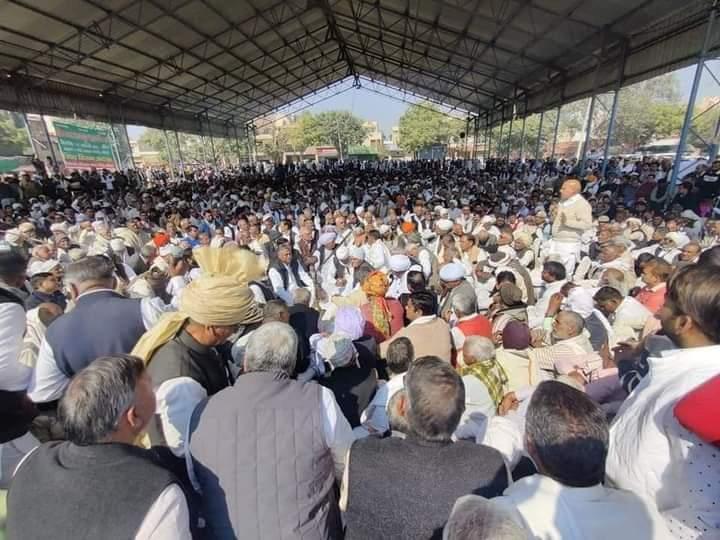
Mahapanchayat at Palwal.
On January 31, a mahapanchayat was organised at the Palwal border in which farmers and panchayat heads (Pal Panch) from 52 Pals or Panchayats around Palwal met and passed a resolution to continue the agitation with full vigour. The mahapanchayat was attended by over 4,000 farmers. It was decided that the movement at Palwal will be strengthened with greater participation of local farmers along with the support of farmers coming from other states. They decided that a total of 20 people – 10 from the youth and 10 from the elderly will be joining the protest from each of the 52 villages.
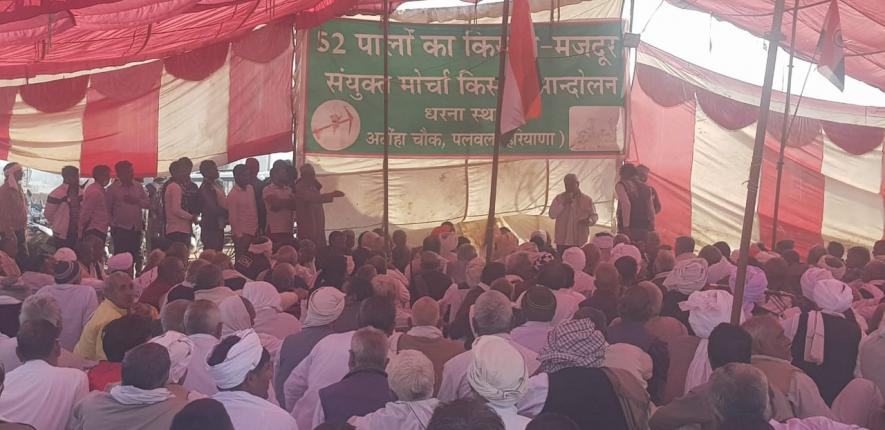
Farmers' protest at Palwal
In the initial two months, the mobilisation at the Palwal border comprised of farmers and organisations from Madhya Pradesh, Chhattisgarh, Orissa, Uttar Pradesh, Punjab and Haryana. Now, the mobilisation is largely constituted of farmers from villages around Palwal. On February 1, amidst heavy mobilisation of police forces, a dharna and hunger strike has started again with the participation of more than 2,000 farmers. In the coming days, the mobilisation is expected to reach 5,000 people.
In response to the fortification of protest sites and other repressive measures taken by the government, the Samyukta Kisan Morcha has given a call for Chakkajam (traffic blockade) of national and state highways between 12 PM and 3 PM on February 6. The highway at Palwal will also be blocked on February 6.
Discussing the plan of action of AIKS, Badal Saroj said that the farmers’ agitation has taken a new shape now and there is a greater focus on reaching out to people in local villages and also joining hands with the workers’ movement. In pursuit of this, AIKS has given a call for demonstrations in support of the protest against the new Electricity Amendment Bill by electricity department employees, engineers and workers on February 3.
Dharna Continues Without Fortifications
Shahjahanpur/Ronak Chhabra: Unlike the protest sites at Singhu, Tikri and Ghazipur, this site has routine police presence but no fortifications. It is located some 80 kms from the Haryana-Delhi border – at the Rajasthan border. This protest has been going on for 53 days.
Farmers from Rajasthan are camped at the site and their numbers have swelled after January 26, with hundreds of local residents joining in. They have been joined by farmers’ representatives from Odisha and even Kerala.
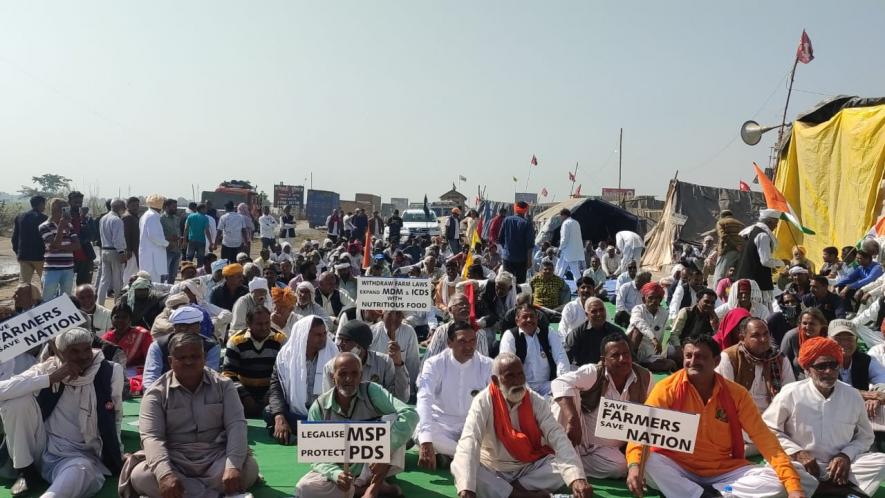
Farmers' protest at Shahjahanpur border.
“We are getting good support from local villagers. They are helping out with food, bedding, etc., and also joining in the dharna,” said Sanjay Madhav, All India Kisan Sabha leader from Rajasthan.
The mood is resolute and energetic among the farmers – they repeat what is being said across all other sites – they will not back down till the black laws are repealed.
Its a Revolution Which Will Unsettle Govt: Say Farmers from Singhu Border
Ravi Kaushal/ Singhu: Braving the concertina wires and beefed up security, slogans are raised intermittently by a group of women who have travelled 35 km from Bidlan village in Haryana’s Sonipat district to Singhu border of Delhi. The slogans raised by the cheering women celebrate the friendship of the neighbouring states, Haryana and Punjab, which had once been involved in bitter fight over sharing of water.
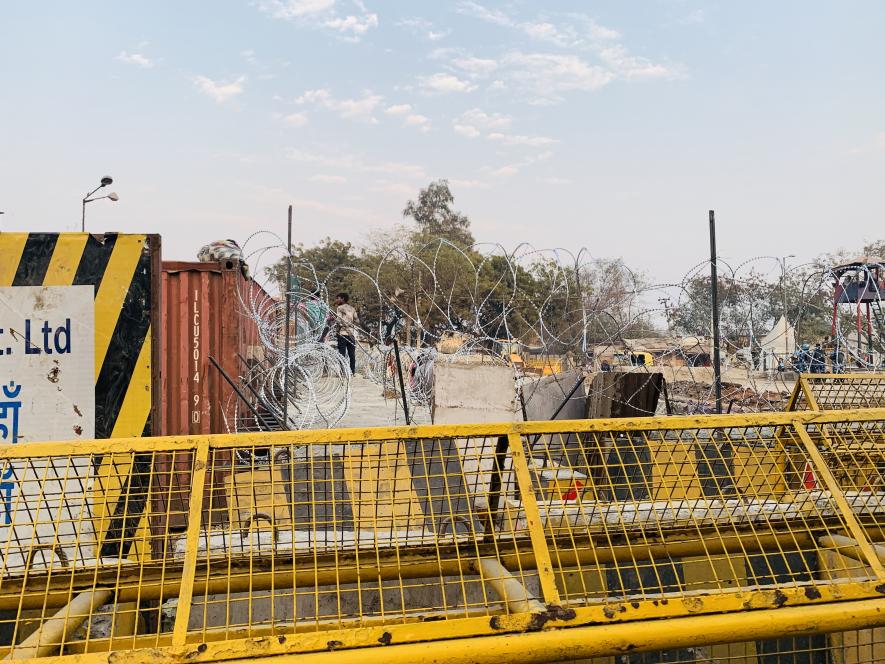
Monica Dahiya, one of the members of the large group, maintains that no amount of barricading, barbed wires and erected nails can stop the agitation which is only swelling day by day. “The violence, now an excuse for cemented barricades and wires, was sponsored by the government. Why would peaceful protesters do violence to bring disrepute to the agitation fought for consistent two months?,” she questioned.
Asserting their resolve to continue the struggle, she added, “We came with only one tractor but more people will come to the border on more tractors. Modi is underestimating our power. We had never heard about a prime minister disrespecting the will of its own people for so long. He is acting like the British. First, he sold our grains, then our mandis and now he is eyeing our land.”
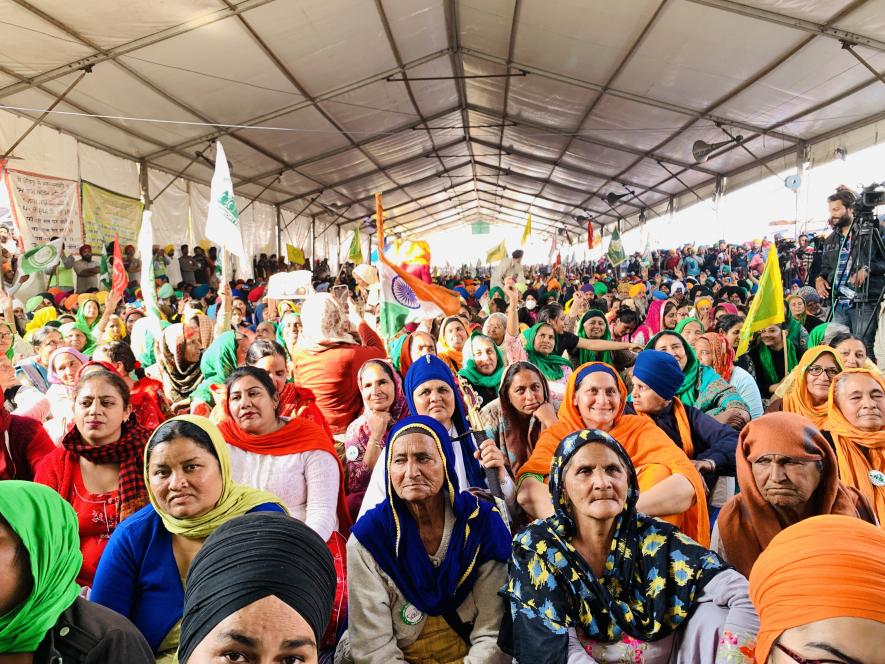
Women farmers at Singhu border.
Following the events on January 26 as well as the comments of a judge, who had questioned the participation of women in the farmers’ protests, more female protesters are now pouring into the protest sites.
On being asked if she had ever thought about participating in a historic struggle as this, Dahiya told NewsClick, “No, I never thought about becoming part of such a long movement but Modi has compelled us to come out to the streets to oppose the wrong.”
Rakesh Bidlan, who drove the tractor from Bidlan, said that he is determined to come every day to the protest. “It really does not matter if the police is fixing nails on the roads. They may bring the cannons if they want, but the farmers will not relent unless our demands are met,” he added.
Get the latest reports & analysis with people's perspective on Protests, movements & deep analytical videos, discussions of the current affairs in your Telegram app. Subscribe to NewsClick's Telegram channel & get Real-Time updates on stories, as they get published on our website.
























